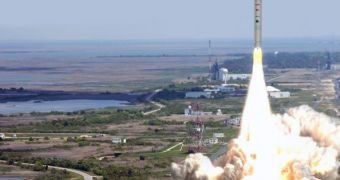Officials from the Dulles, Virginia-based Orbital Sciences Corporation (OSC) announce that the inaugural flight of their company's new Taurus 2 delivery system will be postponed by two months.
The move will see the rocket launch in December rather than October, as originally planned. The delay apparently has nothing to do with the vehicle itself, OSC CEO David W. Thompson said during a conference of July 21.
It would seem that the rocket propellant and pressurization facilities located at the NASA Wallops Flight Facility, in Wallops Island, Virginia, are not yet completed and certified. OSC is using these installations for the upcoming flight.
Rather than speed up the process and allow room for errors, the company prefers to let engineers do their job under optimal conditions. But the delay is forcing the company to delay the first flight of its Cygnus space capsule to the International Space Station (ISS) for February 2012.
Plans call for the spacecraft to be launched two months after the original liftoff of the Taurus 2 delivery system. OSC is already behind in the new space race NASA is funding among private companies.
Hawthorne, California-based Space Exploration Technologies Corporation (SpaceX) has already demonstrated its Falcon 9 rocket on two separate occasions. During the second test flight, the company's Dragon space capsule was deployed, and completed several orbits before landing.
The new delay will set OSC a further step back, which is a dangerous move because NASA plans to keep all four companies involved in the Commercial Crew Development (CCDev) program on a very tight leash, Space reports.
In early June, Orbital Sciences suffered another setback, when one of its Aerojet-developed AJ26 engines failed during a launch attempt. A careful analysis of all motors in OSC's inventory revealed that 67 percent of all engines were in good condition.
A fuel line breakage is what caused the engine to suffer a glitch, officials from the company say. The 33 percent of motors that were found to have the same problem are now being repaired and upgraded.
Thompson added during the conference that the engine troubles will not affect the launch date more than other issues will. Other than SpaceX, OSC is the leader in the pack of companies working to develop affordable spacecraft for NASA.
However, the company's favored position could change at a moment's notice, if it fails to meet the strict NASA guidelines it's operating under. The American space agency is trying to cover the gap in its manned program as soon as possible, while at the same time ensuring the safety of future crews.

 14 DAY TRIAL //
14 DAY TRIAL //